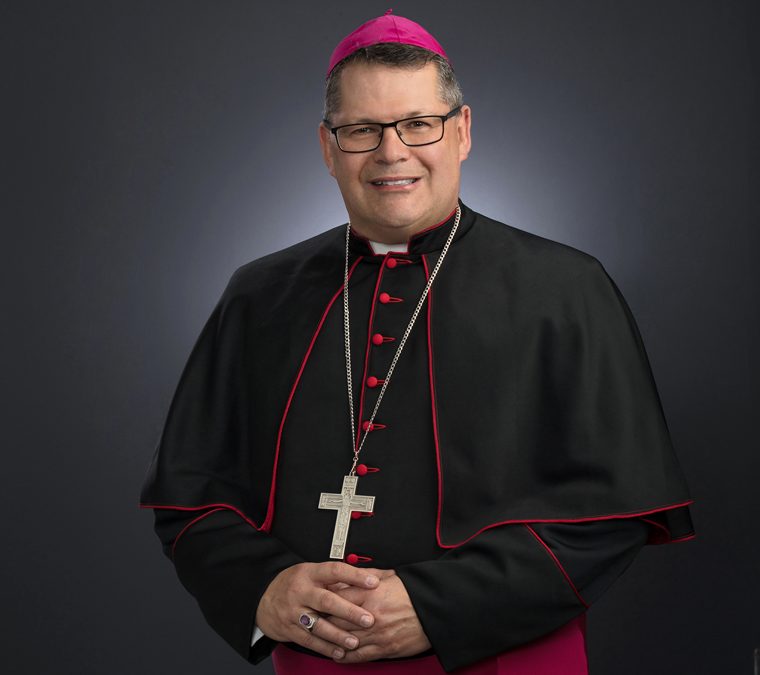Editor’s note: Below is the prepared text of Bishop Lucia’s homily for the July 20, 21, 22, and 23 ordination liturgies of the Diocese of Syracuse’s newest permanent deacons.
Formed… Dedicated… Appointed… These three words, brothers and sisters, set the context for our gathering in this cathedral church this evening. Tonight, after a period of being formed, our brothers, who are certainly young at heart, have come to dedicate themselves to the service of the People of God as deacons of the Catholic Church.
Like the first deacons chosen in the Acts of the Apostles, these men come before a successor of the Apostles to receive the laying on of hands and be appointed; that is, ordained to follow Christ in ministerial service. Through this ancient rite, [the candidates] are sent to be an oracle of the Lord… a living Gospel for all people to hear. Pope-emeritus Benedict XVI was fond of saying, “Christianity is not ‘a new philosophy or a new form of morality,’ but an encounter with the person of Christ, an event that ignites a personal relationship with Him.”
My brothers, through your daily living and service, you extend Christ, the Word of God made flesh, to those you meet along the way.
You must be a bearer of the Good News of Jesus Christ today not merely by preaching the message, but even more importantly by making a sermon of it by the life you lead. Through your own Gospel living, like a grain of wheat, you are called, by letting go and letting God, to bear much fruit and provide especially for those who might feel neglected or forgotten along the way. As St. Ignatius of Antioch would tell the Magnesian deacons: “The deacons, who are so dear to me, are to be entrusted with the service of Jesus Christ.”
Composer Giacomo Puccini wrote a number of famous operas. In 1922 he was suddenly stricken by cancer while working on his last opera, Turandot, which many now consider his best. Puccini said to his students, “If I don’t finish Turandot, I want you to finish it for me.” Shortly afterward he died.
Puccini’s students studied the opera carefully and soon completed it. In 1926, the world premiere of Turandot was performed in Milan with Puccini’s favorite student, Arturo Toscanini, directing. Everything went beautifully until the opera reached the point where Puccini had been forced to put down his pen. Tears ran down Toscanini’s face. He stopped the music, put down his baton, turned to the audience, and cried out, “Thus far the Master wrote, but he died.”
A vast silence filled the opera house. Then Toscanini picked up the baton again, smiled through his tears, and exclaimed, “But the disciples finished his work.” My brothers, never forget this moment in your minds, “You are called to serve and do as the Master has done.”
So sisters and brothers, what does it mean to be a deacon? What are [the candidates] getting themselves into?
(Note: Here follows the official instruction of the ordination rite.)
Beloved brothers and sisters: since these our sons, who are your relatives and friends, are now to be advanced to the Order of Deacons, consider carefully the nature of the rank in the Church to which they are about to be raised.
Strengthened by the gift of the Holy Spirit, they will help the Bishop and his Priests in the ministry of the word, of the altar, and of charity, showing themselves to be servants to all. As ministers of the altar, they will proclaim the Gospel, prepare the Sacrifice, and distribute the Lord’s Body and Blood to the faithful.
Furthermore, it will be his duty, at the Bishop’s direction, to exhort believers and unbelievers alike and to instruct them in holy doctrine. They will preside over public prayer, administer Baptism, assist at and bless Marriages, bring Viaticum to the dying, and conduct funeral rites.
Consecrated by the laying on of hands that comes down to us from the Apostles and bound more closely to the service of the altar, they will perform works of charity in the name of the Bishop or the pastor. With the help of God, they are to go about all these duties in such a way that you will recognize them as disciples of him who came not to be served, but to serve.
Now, dear sons, you are to be raised to the Order of the Diaconate. The Lord has set an example that just as he himself has done, you also should do.
As deacons, that is, as ministers of Jesus Christ, who came among his disciples as one who served, do the will of God from the heart: serve the people in love and joy as you would the Lord. Since no one can serve two masters, look upon all defilement and avarice as serving false gods.
Since, by your own free choice, you present yourselves for the Order of the Diaconate, you should be men of good reputation, filled with wisdom and the Holy Spirit, as were those once chosen by the Apostles for the ministry of charity.
Firmly rooted and grounded in faith, you are to show yourselves chaste and beyond reproach before God and the human family, as is proper for the ministers of Christ and the stewards of God’s mysteries. Never allow yourselves to be turned away from the hope offered by the Gospel. Now you are not only a hearer of this Gospel but also its ministers. Hold the mystery of faith with a clear conscience. Express by your actions the word of God which your lips proclaim, so that the Christian people, brought to life by the Spirit, may be a pure offering accepted by God.
Then on the last day, when you go out to meet the Lord of the Harvest you will be able to hear him say, “Well done, good and faithful servant, enter into the joy of your Lord.”






